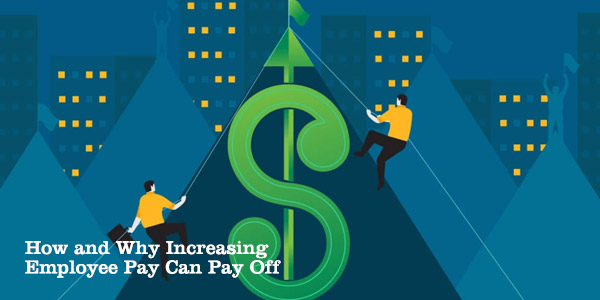Guess what? Companies are figuring out that better pay is better for them—for a whole host of reasons. Even for the people who are hired on an entry level, better pay matters and helps find people who may stick with a company for longer and be better employees.
Of course, that’s true because the strengthening economy and the dearth of workers have collided. There are fewer people looking for jobs and more companies wanting to find a job. That means that employees don’t have to take the first thing offered to them. And almost two-thirds care more about pay when it comes to taking a job.
And once they’ve accepted that job, they’re more likely to stay, which helps to save companies money in the long run. A retained employee is an employee that a company doesn’t have to re-train. Why else is it good? This graphic explains it.
Why increasing employee pay can pay off
Walmart, Target, McDonald’s, Starbucks, and other large companies are boosting entry-level pay, and many corporations have announced larger than usual annual raises this year. Your company may want to follow suit and raise employee compensation. Pay hikes are not only good for employee health and satisfaction: Research suggests they pay off for companies as well.
Recruit Talent
With an improving economy, quality workers are in high demand. Job seekers look at location, benefits, growth opportunities, and work/life balance policies. But above all, they prioritize compensation: 61 percent of employees who responded to a large survey of job seekers said pay is the most important reason they choose jobs.
Retain Employees
High turnover is expensive due to the costs of recruitment, interviewing, hiring, training, and reduced productivity. According to an analysis by the Center for American Progress, a company will spend 21 percent of a typical employee’s annual salary and up to 213 percent of a highly specialized employee’s annual salary on a replacement.
However, employees are not rewarded for loyalty. Most companies bump pay about 3 percenta year (less than one percent above the rate of inflation), but employees can expect a 5 to 20percent raise when changing jobs. According to an analysis published in Forbes, an employee who stays at a company for more than two years rather than switching jobs will make 50 percent less over the course of their lifetimes. That may explain why 45 percent of employees in the job-seeker survey said they’re satisfied with their jobs but open to new opportunities, and 32 percent said they’ve moved to a new company for higher compensation.
Bottom line? If you want to keep your best talent, you need to compensate them for staying put. Unsurprisingly, employee turnover drops when wages go up, according to a number of studies.
Increase Productivity
Productivity levels are strongly connected to how satisfied employees feel with their jobs, and pay factors heavily into feelings of job satisfaction. Thus, raising pay can motivate employees to work harder. New Jersey police officers who received a 17 percent wage increase were 12 percent more productive in clearing cases than those who didn’t receive an increase, according to one study.
Boost Your Brand
In a large 2011 survey, 73 percent of adults rated friendly employees as their top reason to stick with a brand, while 89 percent said they’d pay more for a better customer experience. If you want your brand to be identified with exceptional customer service, you may need to invest more in the employees who serve as the face of your business. After Walmart instituted wage hikes and bonuses for staff in 2015, their customer satisfaction numbers rosedramatically.
How to Raise Pay
Before raising employee pay, take some time to structure increases for the best results. Employees don’t just care about how much compensation they get; they care about how much pay they get in relation to others, and they want a fair and transparent pay structure. If your employees would be surprised, confused, or upset to learn what their colleagues are paid, make sure everyone understands pay plan goals and how they’re determined and evaluated.
Find out how much employees make at similar companies so you can keep your wages competitive. If you pay based on performance, avoid the pitfalls that make many merit-pay systems ineffective. Create a system that routinely assesses observable and measurable performance outcomes, and follow through by rewarding employees who have a great attitude, meet performance goals, and are exceptionally proficient, independent, and responsible. Make sure incentives are significant, and avoid pitting employees against each other for bonuses if you strive for a culture that celebrates collaboration and teamwork. Consider overtime pay as well.
Conclusion
If you’ve always seen labor as a cost driver rather than a sales driver, it may be time to shift your thinking. Boosting employee compensation can make your company more attractive to new hires, reduce turnover, motivate employees to work harder, and improve customer satisfaction. All of these factors can help your company profit long-term.
SPECIALIST RECRUITMENT SOLUTIONS DELIVERING UNRIVALLED RESULTS
IN THE PHILIPPINES
Manila Recruitment is recognized as the leading recruitment firm in the Philippines for headhunting, executive search, expert, technical and IT recruitment. We share an unrivalled passion to help your business succeed by understanding your goals, then sourcing and providing you with your number one asset – driven, dedicated and exceptional people!
Experience the Manila Recruitment difference, and give your business in the Philippines a competitive advantage by contacting us today. Whether you are exploring an offshore solution, or are an established entrepreneur, SME or Multinational in the Philippines, our team has the experience and a tailored recruitment solution to introduce you to the top talent in the Philippines.
Contact our Manila Recruitment team at hello@manilarecruitment.com.
















